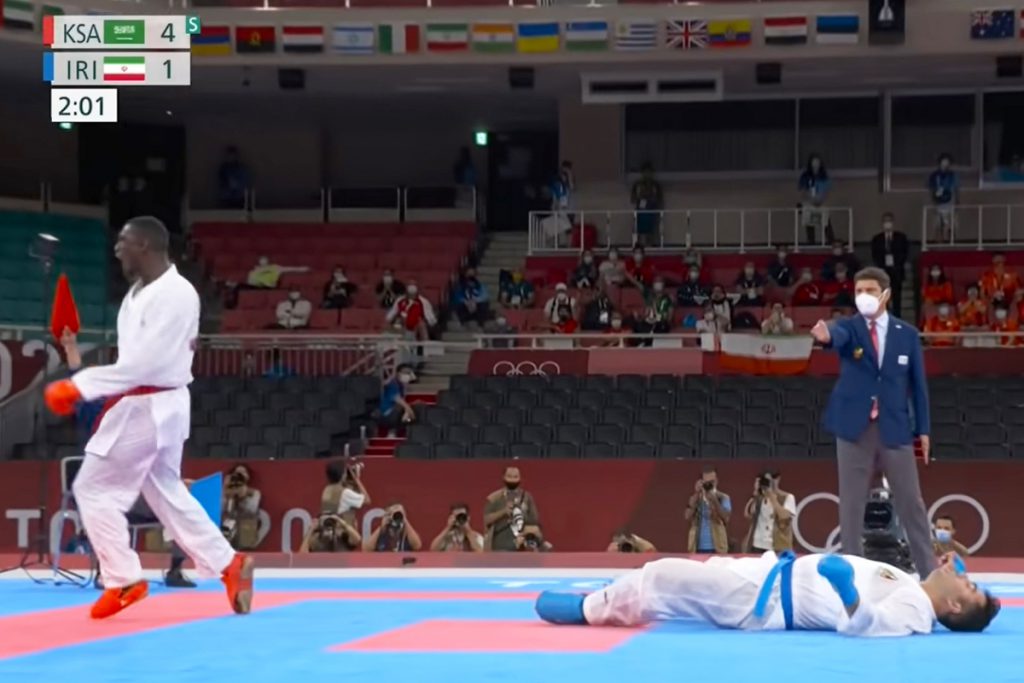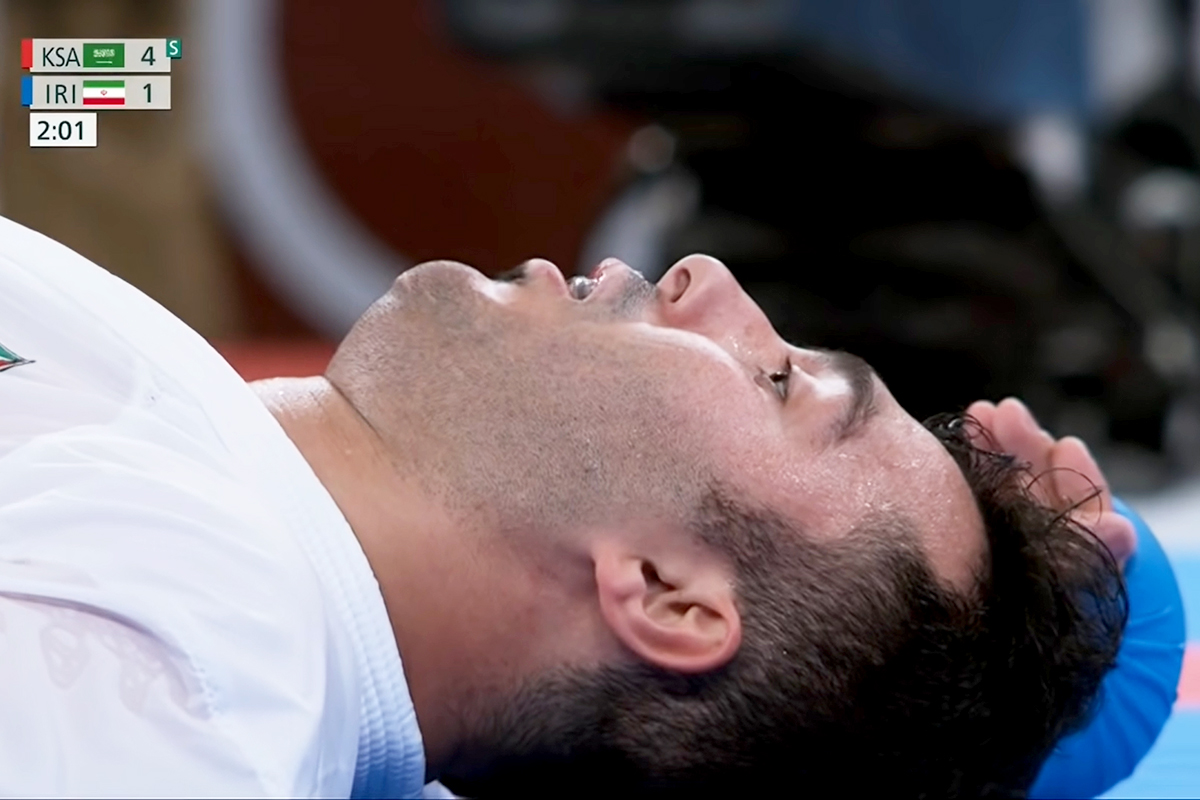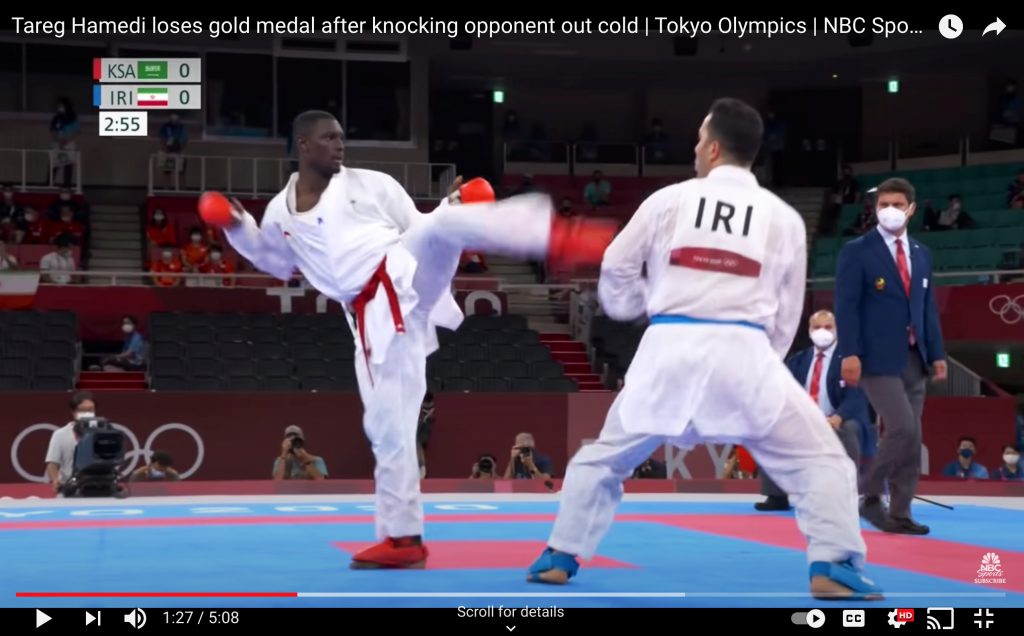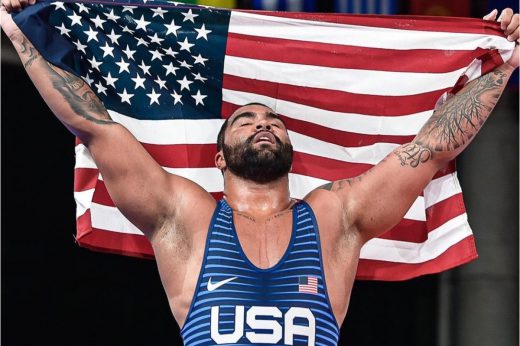The final strike delivered in the Olympic debut of karate had all the drama, power, and intensity that has inspired millions to fall in love with combat sports. Fans who watched the gold-medal bout between Tareg Hamedi (Saudi Arabia) and Sajad Ganjzadeh (Iran) initially felt the elation that accompanies an incredible sports finish. That joy was immediately replaced by confusion and, ultimately, disappointment.
Hamedi and Ganjzadeh went head-to-head on Saturday, Aug. 7, in the final match of the men’s karate kumite +75kg. Kumite is one of three main branches of karate that focuses on sparring and competition while utilizing techniques learned in the other two branches: kihon and kata.
Hamedi built a commanding lead in the first minute before delivering a thrilling front leg roundhouse kick to Ganjzadeh’s head that ended the match, and shockingly, Hamedi’s dreams of Olympic gold as well.
Although the kick put Ganjzadeh firmly on the mat, flat on his back and glassy-eyed, Hamedi did not get the win. Quite the opposite.
Officials deemed the kick “too forceful” and disqualified Hamedi, meaning Ganjzadeh won by default. Ganjzadeh was taken from the mat on a stretcher. When he regained his faculties backstage, he was told he’d won an Olympic gold medal by getting knocked out.
Olympic officials in the sport consider dramatic, high-powered moves, like Hamedi’s kick to the head, too dangerous for competition, and it was decided the kick constituted a disqualifying penalty. In competitions, karateka (karate practitioners) are expected to pull their strikes and refrain from following through with their full power.
Hamedi left the mat in tears after an enthusiastic but premature celebration. If he’d won the bout and the gold, it would have been the first Olympic gold medal ever for Saudi Arabia in any sport.
Hamedi and Ganjzadeh later hugged and celebrated together at the medal ceremony in an epic display of sportsmanship. Still, it was apparent both athletes had conflicted feelings about the match’s outcome.
“I’m very happy that I achieved this gold medal, but I’m sad that it had to happen like this,” Ganjzadeh told reporters.
“If you ask me if I agree or not, I disagree, of course, because I love the gold medal,” Hamedi said during a press conference via a translator. “But I am satisfied with the level of performance I gave, and I accept their decision. I don’t have any objection. I think I played well.”
Hamedi was awarded the silver medal in the event, while Ugur Aktas (Turkey) and Ryutaro Araga (Japan) both took bronze.
The karate world was immediately incensed over the controversial decision — some experienced martial artists fully supported the judges’ call, while others disagreed.

“Part of being a martial artist is control and [having] enough discipline to follow the rules,” said Tim Garriss, a third-degree black belt in Goju-Shorin karate.
Steven Borkowski, a black belt in Shotokan karate, was critical of the decision and said modern kumite largely ignores karate’s martial-arts origins.
“How could a fighting system [like karate], where the main purpose is to destroy, obliterate, and conquer the enemy, be all about control?” Borkowski said. “It’s really difficult to gauge the effectiveness of actual karate techniques in sport competition if punches and kicks are being pulled. Sport is sport, and real fighting is something different altogether.”
As fans got a small taste of what the sport can deliver, the decision certainly left a bad taste in the mouths of some. If moves like Hamedi’s showstopping kick don’t belong in competition, nobody should be surprised if fans lose interest in watching.
After advocates of the sport fought for nearly 50 years to get karate a spot on the Olympic stage, its future is uncertain. Karate is not currently part of the lineup for the 2024 Olympics in Paris.
Read Next: Teenager Makes History as First American Woman To Win Gold in Taekwondo









Comments